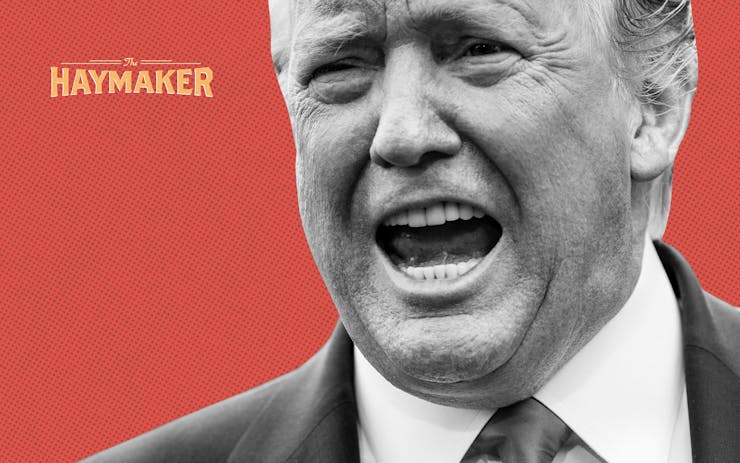Every September the folks at the National Organization for the Reform of Marijuana Laws (NORML), the nation’s oldest cannabis legalization group, bring lobbyists, political scientists, reporters, organizers, state lawmakers, and members of Congress together in Washington, DC, to talk shop. Wins and losses are tallied, strategies are debated, the year ahead is forecast. The three-day event always offers a bracing, concentrated blast of both hope and cold reality.
Here’s a report from the front—or, what you need to know as Congress winds down its long summer vacation.
Change, fast and slow
Some things are changing quickly. Justin Strekal, NORML’s rumpled and brilliant political director, noted that “when I started doing this three years ago, there were six paid industry lobbyists working marijuana policy on the Hill. Now there are over 60.”
Trump will do anything to get re-elected. If he senses a couple percentage points in a legalization pivot, he just might jump on it.
Other things move glacially—which isn’t all bad. Glaciers move slowly, but they always grind forward. When asked to predict when Congress might finally end federal cannabis prohibition, the most optimistic answer was the year 2021. “Not this year, not 2020,” said Amber Littlejohn, senior policy advisor at the Minority Cannabis Business Association. “We’re looking at two to three years, maybe longer.”
If it happens, it’ll likely be in the year “before the 2024 election,” said Michelle Rutter, congressional lobbyist for the National Cannabis Business Association (NCIA). “A lot hinges on what happens in the Senate.”
The Trump factor
Kris Krane, founder of 4Front Ventures and one of the advocates behind Massachusetts legalization, threw out a wild card. “There’s a potential X factor here,” he said. “I still think there’s a plausible possibility that President Trump will come out in support of cannabis reform in 2020.” Why? “Because it would be smart political strategy for him to do so.”
Krane’s theory rides on the rising tide of national polls showing support for full legalization at 65% to 68%. The political strategy makes even more sense if Joe Biden claims the Democratic nomination. Biden, a notorious 1990s drug warrior, remains the only Democratic primary contender who refuses to embrace legalization. “Joe Biden,” noted NORML’s Justin Strekal, “is to the political right of every Republican on the House Judiciary Committee on this issue.”
Trump hates cannabis, but…
I’ve written previously about my belief that Trump personally loathes legalization and all things cannabis. (And, we found out this week, vaping.) His worldview formed in the 1970s and 1980s, when cannabis remained entwined with hippies and the counterculture—dirty, disgusting people in the mind of a man who aspired to a life of limousines and gilded toilets. Trump also considers rural county sheriffs, last of the drug war holdouts, to be a core part of his base.
Shop highly rated dispensaries near you
Showing you dispensaries nearAt the same time, Trump is a man who will do anything to get re-elected. If he senses a couple percentage points in a legalization pivot, he just might jump on it. Such a move won’t sway any Democrats. But it might give younger undecideds a reason to vote against Biden.
During his first two post-election years, Trump served as a kind of legalization Rorschach test. Skeptics shook their heads at his appointment of Jeff Sessions and the revocation of the Cole memo. Supporters pointed to his defense of states’ rights and comments ostensibly in support of medical cannabis. Which is to say: Trump doesn’t necessarily need to do anything. It might be enough for him simply to posture as though he’s considering it.
It’s a company town
Washington DC is a weird political town. Everybody who lives there is involved in politics, but when you walk around the city you rarely hear the kind of political chatter that’s common in Seattle, San Francisco, New York, Boston, or Chicago. There’s no Trump talk in the streets.
Want to kill a bad bill? Show up at the markup hearing and don’t leave until your bill gets addressed.
People in DC like the status quo. They’re not out demonstrating in front of the White House. That’s what other Americans do when they come to DC.
Sen. Ron Wyden (D-Oregon), the longtime legalization advocate who addressed the NORML conference on Monday afternoon, brought home the truth. “Political change doesn’t start in Washington DC and trickle out,” Wyden said. “It starts with the grassroots and comes to DC from the ground up.”
“There is no reason for cannabis to remain a Schedule I drug,” Wyden said. “It is obvious to you and me. It is obvious to medical professionals. It is obvious to most folks other than that fellow who runs the Senate floor,” he said, referring to Senate Majority Leader Mitch McConnell (R-Kentucky).
Want legalization? Show up and speak out
Why hasn’t it changed? Inertia. It costs members of Congress nothing to do nothing.
Time and again this week I heard local legalization advocates recount how they got their bills passed. It’s all about putting pressure on politicians. It’s about speaking out, showing up, and getting other people—normal people, not professional lobbyists—to do the same. The most powerful phrase in American politics is “I’m your constituent.”
Got a committee chair who refuses to consider a bill? Start a social media campaign to call her office. Keep calling. It works. (Hat-tip to Nevada activist Madisen Saglibene, who made it happen in her state.)
Want to kill a bad bill? Show up at the markup hearing and don’t leave until your bill gets addressed. Politicians notice the people who stay.
“Political changes happens when people show up at their city council and at their legislative offices,” said Wyden.
As we enter the autumn political season, it’s time to do your part. Keep contacting your Congress members and your state legislators. Let them know you’re a constituent, you vote, you give a damn about this issue, and you’ve got a loud fucking voice. Don’t wait for them to act—make them act.





